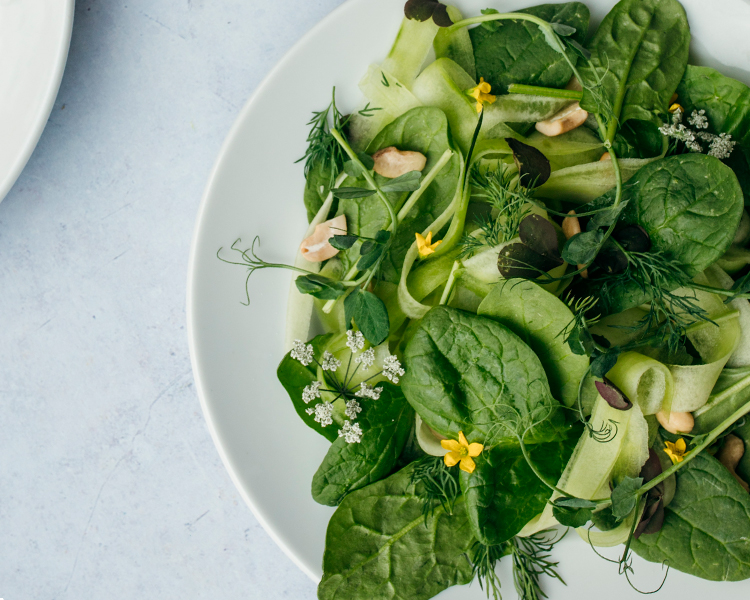


Nutrition / Advice
May 4th, 2022
Seasonal fruits and vegetables: the secret to healthy skin!
By Béatrice de Reynal, Doctor in Nutrition.
The blazing sun in summertime, cold spells in winter – each season, our bodies must defend themselves against harsh outdoor elements. A healthy, balanced diet helps our bodies stay protected so they not only survive, but thrive through climate cycles. And our greatest allies to do this are in-season fruits and vegetables! When eaten at the right time, they are important contributors to our overall well-being.
Respecting the rhythm of the seasons means we also honour our bodies’ needs. Could that possibly be the secret to good health? Let’s find out how eating ripe fruits and vegetables benefits the body and what the best seasons are to enjoy them, when they are at the peak of their nutritious goodness.
3 good reasons to eat fruits and vegetables in season
1. Eating produce in season means respecting the cycle of life
Our inner planet thrives by virtue of a balance that is all our own and that involves our environment: the food we eat, how we take care of our bodies, our sleep habits, the air we breathe, the water we drink. Each living being has its own cycle, from humans to plants! It is healthiest to respect this symbiosis, both to stay in tune with nature’s rhythm and to satisfy the body’s needs. The natural cycles of fruits and vegetables means we can enjoy, in every season, the essential nutrients corresponding to the phases of our own (physiological) seasons: synergy at work!
2. It means savouring the best that nature has to offer
Fruits and vegetables share their greatest nutritional treasures when they are harvested at the right time, under the right conditions. As they grow and ripen, they are enriched with vitamins, minerals, trace elements and antioxidants that help us fight the free radicals responsible for the premature ageing of our bodies’ tissues. And to be sure we take advantage of all the nutrients they contain, let’s remember to vary how we prepare them, as in-season produce can be eaten many ways: raw, cooked, whole, mashed, in sauces and soups, in sweet and savoury dishes.
3. Eating seasonal fruits and vegetables also means keeping the planet’s well-being in mind!
Respecting these natural cycles helps preserve the environment, too. When we eat local produce, we avoid consuming fruits and vegetables that travelled from distant lands and were picked before they were ripe to withstand the journey. Choosing produce that is organically and/or sustainably grown means giving our bodies clean and healthy food that is also good for the health and balance of our ecosystem.

Good-for-you fruits and vegetables in every season!
In the spring, they give the body a boost
The weather is still unpredictable: damp, chilly days can lead to respiratory and intestinal infections, so the body needs more vitamin C to strengthen its resistance to illness. And spring is the time for berries – including blackcurrant, bursting with this precious vitamin! -, spinach and other leafy greens that are also high in vitamin B9 and provitamin A, as well as all the aromatic herbs that add flavour to the year’s first fresh salads.
Have you heard? Vitamin C is supplied almost exclusively by fruits and vegetables and, because it is not stored in the body, it must be taken daily. What better reason could there be to treat yourself to some fresh-squeezed orange juice every day? It’s like a little ray of sunshine, ready to brighten your day and boost your immunity!
In summertime, they keep us cool
Water-rich fruits and vegetables are a delicious dose of hydration and brighten our summer salads with their rainbow of colours! They help prepare our skin for the heat, too, as peaches, apricots, tomatoes and their cousins are high in provitamin A, with well-known protective antioxidant properties. They also contain natural vitamin pigments that care for our eyes by repairing the retinal damage caused by light rays, and help protect our skin by working with the action of its natural systems to create an initial pigmentary screen.
In autumn, they boost and brighten
For a healthy, happy body when September comes, peppers and kiwis ripen at summer’s end, ready to boost our immune system again. As soon as temperatures start to drop, seasonal fruits and vegetables help protect us from catching a chill! Farmers’ markets and produce aisles see the arrival of root vegetables that are naturally high in protective antioxidants or provitamin A, such as pumpkin or carrot, deservingly reputed to give skin a slight golden glow when consumed in quantity, stretching summertime out a bit longer.
In winter, they serve up plenty of fibre and vitamins
Winter vegetables, denser than their summer counterparts and a bit higher in carbohydrates (but still very low in calories at 30 to 35 Kcal/100 g), help us fight the cold by maintaining our body temperature. Being high in fibre, they keep the digestive system regular and working as it should. They also regulate our blood sugar, and therefore our hunger, helping us to feel full quickly. Pumpkins, nuts and root vegetables supply valuable vitamins, as well, even when cooked. Enjoy with a drizzle of rapeseed or flaxseed oil, packed with healthy Omega-3 fatty acids!